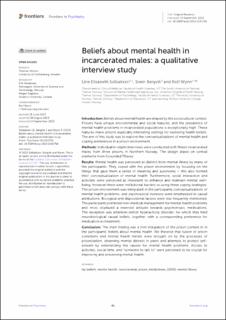| dc.contributor.author | Solbakken, Line Elisabeth | |
| dc.contributor.author | Bergvik, Svein | |
| dc.contributor.author | Wynn, Rolf | |
| dc.date.accessioned | 2024-01-03T17:27:50Z | |
| dc.date.available | 2024-01-03T17:27:50Z | |
| dc.date.created | 2023-08-30T11:18:59Z | |
| dc.date.issued | 2023 | |
| dc.identifier.citation | Frontiers in Psychiatry. 2023, 14, Artikkel 1242756. | en_US |
| dc.identifier.issn | 1664-0640 | |
| dc.identifier.uri | https://hdl.handle.net/11250/3109640 | |
| dc.description.abstract | Introduction: Beliefs about mental health are shaped by the sociocultural context. Prisons have unique environmental and social features, and the prevalence of mental health problems in incarcerated populations is exceptionally high. These features make prisons especially interesting settings for exploring health beliefs. The aim of this study was to explore the conceptualizations of mental health and coping preferences in a prison environment. Methods: Individual in-depth interviews were conducted with fifteen incarcerated males from three prisons in Northern Norway. The design draws on central elements from Grounded Theory. Results: Mental health was perceived as distinct from mental illness by many of the participants. They coped with the prison environment by focusing on the things that gave them a sense of meaning and autonomy – this also formed their conceptualization of mental health. Furthermore, social interaction and activities were perceived as important to enhance and maintain mental wellbeing, however there were institutional barriers to using these coping strategies. The prison environment was integrated in the participants conceptualizations of mental health problems, and psychosocial stressors were emphasized in causal attributions. Biological and dispositional factors were less frequently mentioned. The participants preferred non-medical management for mental health problems and most displayed a reserved attitude towards psychotropic medications. The exception was attention-deficit hyperactivity disorder, for which they held neurobiological causal beliefs, together with a corresponding preference for medication as treatment. Conclusion: The main finding was a firm integration of the prison context in in the participants’ beliefs about mental health. We theorize that fusion of prison conditions and mental health beliefs were brought on by the processes of prisonization, observing mental distress in peers and attempts to protect selfesteem by externalizing the causes for mental health problems. Access to activities, social time, and “someone to talk to” were perceived to be crucial for improving and preserving mental health. | en_US |
| dc.language.iso | eng | en_US |
| dc.publisher | Frontiers Media S.A. | en_US |
| dc.rights | Navngivelse 4.0 Internasjonal | * |
| dc.rights.uri | http://creativecommons.org/licenses/by/4.0/deed.no | * |
| dc.subject | lay beliefs | en_US |
| dc.subject | mental health | en_US |
| dc.subject | incarcerated | en_US |
| dc.subject | prison | en_US |
| dc.subject | attributions | en_US |
| dc.subject | ADHD | en_US |
| dc.subject | mental illness | en_US |
| dc.title | Beliefs about mental health in incarcerated males: a qualitative interview study | en_US |
| dc.type | Peer reviewed | en_US |
| dc.type | Journal article | en_US |
| dc.description.version | publishedVersion | en_US |
| dc.rights.holder | © 2023 Solbakken, Bergvik and Wynn. | en_US |
| dc.subject.nsi | VDP::Medisinske Fag: 700::Klinisk medisinske fag: 750::Psykiatri, barnepsykiatri: 757 | en_US |
| dc.source.volume | 14 | en_US |
| dc.source.journal | Frontiers in Psychiatry | en_US |
| dc.identifier.doi | 10.3389/fpsyt.2023.1242756 | |
| dc.identifier.cristin | 2170850 | |
| dc.source.articlenumber | 1242756 | en_US |
| cristin.ispublished | true | |
| cristin.fulltext | original | |
| cristin.qualitycode | 1 | |

